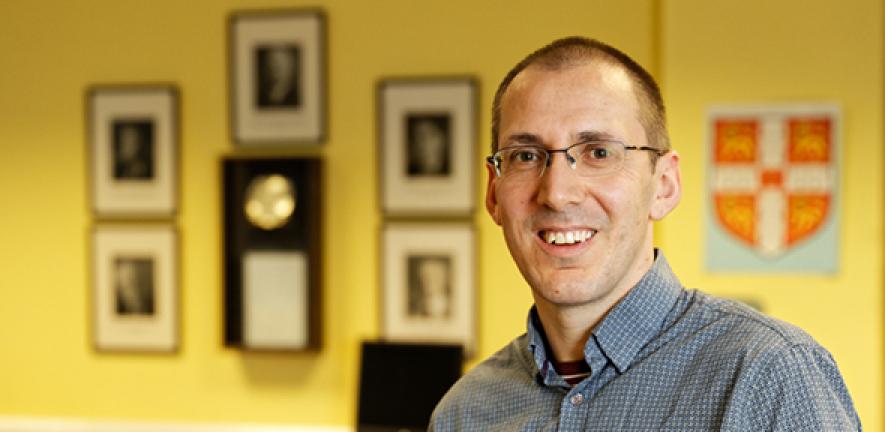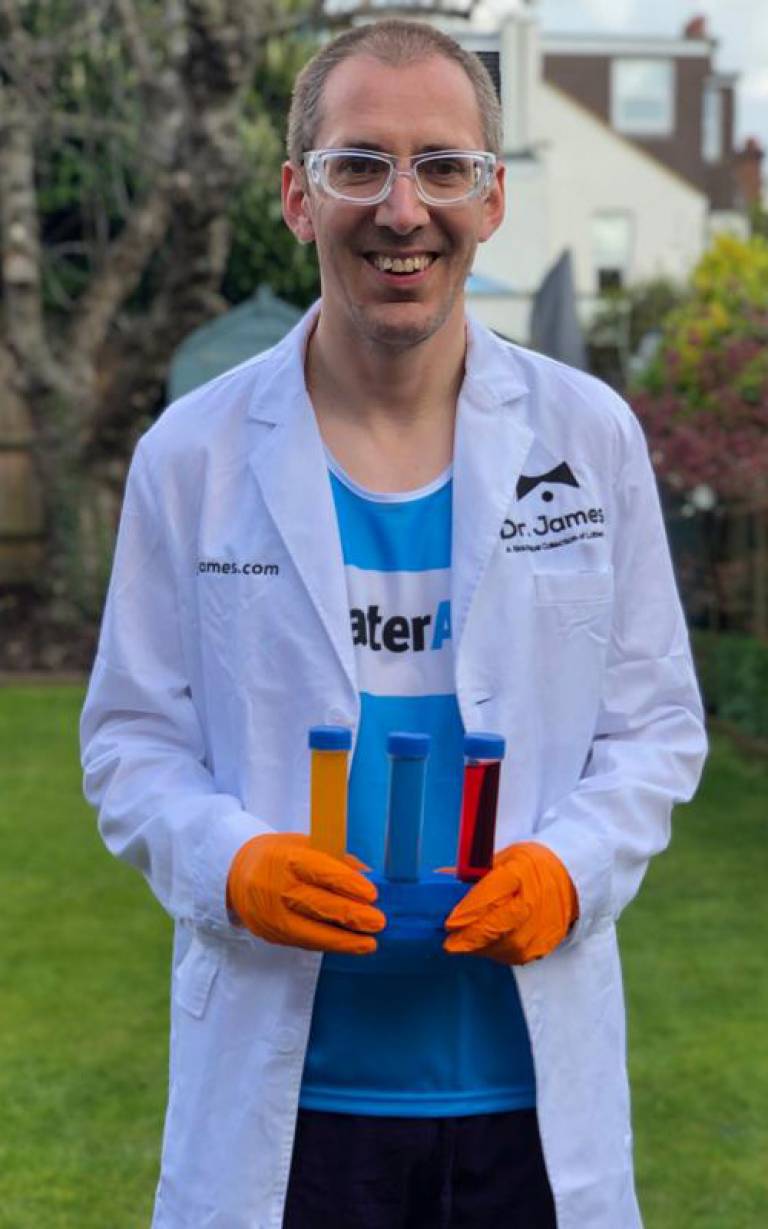
In April this year, he competed in the London Marathon, wearing a traditional white lab coat, safety goggles and lab gloves, and carrying test tubes from his 4-year-old daughter’s science kit. While he readily concedes that "not all scientists are middle-aged men in white coats," at the time he was competing to set a new world record for the 'fastest marathon dressed as a scientist (male)', and this was the official uniform required by Guinness. Angelos was running to support WaterAid, an international charity working to provide clean water and decent toilets to people all over the world.
 Water and its structure is something close to Angelos's heart. As a Professor of Theoretical Chemistry at University College London (UCL), he has been working on a better understanding of water and ice, especially the molecular-level insight needed to solve some of the world’s water problems.
Water and its structure is something close to Angelos's heart. As a Professor of Theoretical Chemistry at University College London (UCL), he has been working on a better understanding of water and ice, especially the molecular-level insight needed to solve some of the world’s water problems.
He is interested in developing and applying computer simulation approaches to better understand materials and their surfaces, "with the most important substance of all – water – being a particular focus," he says.
Now Angelos will be bringing his expertise to this department as our new 1968 Professor of Chemistry.
"I am absolutely delighted that Professor Michaelides will be joining us in this role," says Head of Department Dr James Keeler. "He not only brings us some truly innovative and outstanding science, but also a record of bringing people together to work in teams across institutions and disciplines."
"I'm looking forward to working with Angelos," says Professor David Wales, Chair of the Theory Group in the Chemistry Department. "We've already identified some new projects to work on together. There is great potential to combine expertise in the Theory Group with some of the methods that Angelos has developed to advance the field."
Angelos says: "I’m very excited to be returning to Cambridge and the opportunities this holds for strengthening existing and developing new collaborations."
New collaborations
One existing connection here is with Professor Stephen Jenkins from the Physical Chemistry Group; they have common interests in surface chemistry and catalysis. "I’m really happy that Angelos is joining us; he’s definitely somebody that I’m keen to work with more," says Stephen, who was a postdoctoral researcher with Angelos in Professor David King’s group in the early 2000s. They have remained friends and collaborators ever since.
After leaving Cambridge, Angelos worked at the Fritz Haber Institute in Berlin with Matthias Scheffler, "one of the two or three really big names in Density Functional Theory (DFT) as applied to surfaces," says Stephen. Angelos then joined UCL in 2006, rising to Professor in 2009. "It was fairly obvious even when we were postdocs that Angelos would be a star," Stephen recalls.
Stephen explains that Angelos is known for two key aspects of his research: “One is using DFT for studying water on metal surfaces – it’s a particularly challenging topic, partly because there’s often a very fine balance of whether water will stay on a surface intact or dissociate into H and OH, but also because of the way water molecules bind to each other through hydrogen bonding,” Stephen explains. “He’s been very good at staying focused on this one important problem and really pursuing that.”
The other aspect is Angelos’ work in developing new DFT techniques. The quantum chemical techniques used to study small molecules are generally too expensive to apply to large surfaces, so DFT is used for surfaces because it’s faster, but it involves approximations relating to electron correlation, which has led to various issues. For example, one notorious problem with DFT is that it has traditionally not been able to deal with Van der Waals interactions. "Angelos has made significant contributions to solving this issue," says Stephen, "and we look forward to having someone here who is working on that aspect of DFT. He’s also good to work with, very collegiate, very enthusiastic and straightforward."
Awards
Angelos has received a number of honours and awards for his research including the Royal Irish Academy Young Irish Chemist of the Year (2000), a European Young Investigator Award (2005), two European Research Council grants, a Royal Society Wolfson Research Merit Award (2012), the Marlow Award and Corday-Morgan Prize from the Royal Society of Chemistry, and a Bessel Award from the Alexander von Humboldt foundation.
The Chair he will hold here was last occupied by Professor Daan Frenkel who retired from the position in 2015, although he continues his research into self-assembling structures and materials. Daan says: "I am thrilled. Angelos is a great theoretical chemist who will move the boundaries of the field. At the same time, he is working on problems of great (and growing) practical relevance – and I am convinced that this combination will be very attractive to potential students and postdocs. As a late-career student, I for one hope to learn from Angelos."
"Theoretical Chemistry has always been strong here in Cambridge, and I am confident that Angelos will, through his science and his leadership, further develop this outstanding feature of the Department," says James.
"Once again, the Theory Group has managed to attract a great colleague to Cambridge; we are delighted that our search has produced a worthy member of the team,"says David.
By the way, Angelos’ time in the marathon was three hours and 22 minutes – a new world record for “fastest marathon dressed as a scientist.” Angelos may not be wearing a lab coat for his computer simulations, but he’s definitely a scientist that will be here for the long run.

